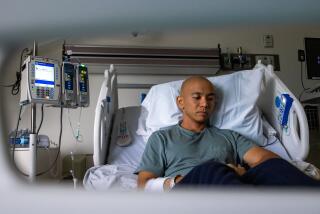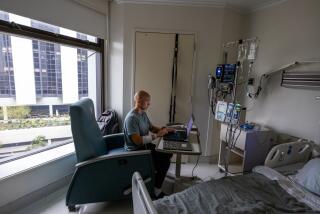Judge Asked to Order Twins’ Blood Tests : Transplant: The Chicago case pits feuding parents. They disagree on whether the children should be bone marrow donors for half-brother.
- Share via
CHICAGO — A gravely ill boy, spiteful ex-lovers and the agony of parenthood converged in a courtroom here Thursday as a judge was asked to order 3-year-old twins to be tested as potential bone marrow donors for a half-brother with leukemia.
Tamas Bosze, a suburban tavern owner, wants the tests in a desperate attempt to save the life of his 12-year-old son, Jean Pierre, one of five children he has fathered with four different women. Doctors say the youngster will surely die in a matter of months without a transplant and, according to at least one expert, will probably die even with one.
Nancy Curran, Bosze’s onetime fiancee and the mother of the twins fathered by him, said she will not allow her children to donate marrow because the procedure could be painful and expose them to the risk--albeit slight--of dangerous side effects from anesthesia. Agreeing to blood tests, used to determine genetic compatibility of a donor and a recipient, would open the door to demands for the transplant itself should the tests match, Curran claims.
Physicians have already ruled out Bosze, Jean Pierre’s mother and his two other siblings as donors. Earlier in the week, Jean Pierre’s doctor testified that the best odds for finding a match for his patient lay with the twins, Allison and James Curran.
Marrow transplants have proved effective in stimulating the body to fight off leukemia, which is usually fatal. However, the marrow of the donor and recipient must have common genetic threads. Such a match is most likely in the case of brothers and sisters. While half-siblings are more likely to have compatible marrow than perfect strangers, experts say that the odds of such a match are still very remote.
The heart of the controversy involves only the health and welfare of the three children. But there are broader implications to the case being argued before Cook County Circuit Judge Monica Reynolds, who has scheduled more hearings on the matter.
Underlying the dispute is the bitterness of a failed relationship between Bosze and Curran, who fought a 16-month legal battle with her former lover to get him to acknowledge paternity and pay child support for the very children he now wants to test. Curran lived on public aid while that paternity case was pending, she testified.
And, depending on the eventual outcome, the case could have implications for both the legal and medical communities. Legal authorities say an order compelling someone to make a medical donation would be precedent-setting.
Some medical experts contend that the idea of forced donations could deter people from adding their name to a national registry of potential marrow donors. On the other hand, a spokeswoman for the registry said the case only underscores the need for such a program and the added publicity could actually prompt more people to sign up.
During a break in Thursday’s hearing, Bosze charged that Curran was being petty and was trying to block the tests out of revenge. “If that’s so,” he said, “I feel sorry for her because she’s taking it out on Jean Pierre.”
But Curran said that her sole goal was to protect her youngsters. “I don’t want to see my children in pain,” she said. “There are risks. There can be problems. My children are healthy and my main concern is (my) children.”
Though much of Thursday’s session was technical, there was also much that was highly personal. In her testimony, Curran sought to portray Bosze as anything but a model father.
In addition to Jean Pierre and the Curran twins, Bosze also has two other children. One is 23 years old, the other only a year old. Bosze has been married twice, but he has had children with four women in all.
Curran said she moved into Bosze’s home when they became engaged in April, 1986. She said he threw her out of the house in August of that same year after accusing her of having an affair, something she denies. By the time of the breakup she was already pregnant, Curran testified.
Several months after the twins were born, Curran filed a paternity suit which Bosze fought. As part of that action, Curran submitted her children to tests to prove that they had the same blood type as Bosze.
Because of the tests, Bosze finally acknowledged paternity and the case was settled in February, 1989. In the interim, however, Curran said he provided no financial support for the children and she was forced to live off welfare and the generosity of her mother.
Until shortly before he asked for help for Jean Pierre, who only recently moved in with his father, Bosze was five months in arrears on his $975-a-month support payments, she added.
Ironically, however, Bosze’s attorney, Edward Jordan, sought to use the paternity suit to bolster his argument for new tests. “Here is a woman who is perfectly willing to bring those children forward for a blood test to get money . . . but she will not bring the twins forward to take the same test to save the life of a sibling,” Jordan argued.
Frank Johnson, a cancer specialist who heads the pediatric bone marrow transplant program at the University of Chicago Medical Center, said that Jean Pierre had less than a 5% chance of surviving even with a transplant.
“His prognosis has to be said to be very poor no matter what treatment we use,” Johnson said.
Testifying on Curran’s behalf, Johnson said that a using marrow from a half-brother or sister rather than a full sibling also greatly increased the risk of complications to Jean Pierre, which could hasten his death.
However, he said that a transplant procedure posed only a slight risk of serious harm to the Curran twins and would probably cause no more than a few days of pain or discomfort.
To obtain marrow, doctors stick long needle-like devices into the hip of a donor. Because Jean Pierre is so much bigger than either of the Curran children, Johnson said if one of the 3-year-olds became a donor the child would have to be stuck up to 100 times to extract enough marrow for a transplant.
Steven Lubet, an expert in legal ethics at Northwestern University, said that any order forcing either blood tests or a transplant would run counter to well-established legal precedent. Lubet said courts have consistently ruled that individuals cannot be forced to come to the medical assistance of others.






